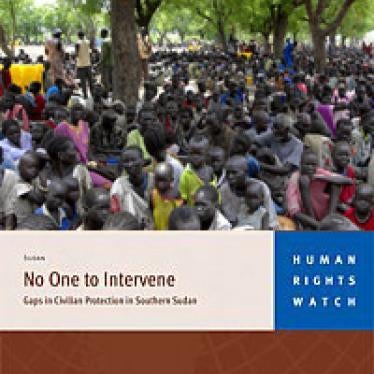(New York) - The Southern Sudan government, the United Nations, and international donors should urgently address critical failures to protect civilians from ethnic violence, Human Rights Watch said in a report released today. On June 23, 2009, the parties to the 2005 Comprehensive Peace Agreement that ended Sudan's long civil war between the southern Sudan People's Liberation Movement and the National Congress Party, donors, and international supporters will meet in Washington, DC to review implementation of the agreement, including security arrangements.
The 15-page report, "No One to Intervene: Gaps in Civilian Protection in Southern Sudan," highlights a recent surge in ethnic violence and the failure of the Government of Southern Sudan and the United Nations Mission in Sudan (UNMIS) to protect civilians. In March and April 2009, armed civilians from the Lou Nuer and Murle ethnic groups in Southern Sudan's Jonglei state killed an estimated 1,000 men, women, and children, and abducted about 150 women and children in vicious attacks and counter-attacks. Government officials knew the conflict was brewing but did not take steps to prevent it or protect civilians, nor did the UN mission address the impending violence, said Human Rights Watch.
"The people of Southern Sudan have a right to expect their government to protect them," said Georgette Gagnon, Africa director at Human Rights Watch. "But the brutal violence in Jonglei showed all too clearly how unprotected they are."
Senior leaders of the Government of Southern Sudan should go to troubled areas in an effort to prevent violence and human rights abuses, strengthen police presence in those areas, and train soldiers in civilian protection, Human Rights Watch said.
In Jonglei, the Southern Sudanese Police Service (SSPS) were too few or absent from most attack sites and lacked training and equipment to protect civilians. The Southern Sudanese military, the Sudanese People's Liberation Army, despite having bases near the affected areas instructed soldiers not to intervene to protect civilians, reportedly out of concern that the soldiers would clash with armed civilians.
Although government officials were warned of the impending violence, they did not go to the Lou Nuer and Murle areas until after the March attack. In addition, a committee of government officials carried out an investigation after the attacks but has not taken any steps to prosecute those responsible for the large-scale crimes.
The UN peacekeepers, mandated to protect civilians and to monitor alleged violations of the Comprehensive Peace Agreement, were not present at the attack sites. Based at the state capital, Bor, the peacekeepers increased visits to the affected areas after the March attacks but did not travel to most of the remote sites where civilians were killed. In May the peacekeepers temporarily deployed some 120 military and civilian staff to the two affected areas to assist in peacebuilding efforts.
"While the peacekeeping force's presence in Jonglei is helpful, it should increase its presence in hotspots through regular visits, patrols, and bases in an effort to prevent further attacks and protect civilians," said Gagnon. "It should also conduct thorough human rights investigations into any alleged attacks and help the southern government find ways to provide justice in remote areas."
The southern government and peacekeepers have also failed to protect civilians from ethnic violence in other locations, including from ongoing deadly attacks by the Ugandan Lord's Resistance Army rebels in the provinces of Central and Western Equatoria, and from clashes between the southern Sudan People's Liberation Army and the Sudan Armed Forces in Malakal that killed more than 30 civilians in February 2009.
The danger of violence across Southern Sudan could intensify in the months ahead, leading up to national elections scheduled for February 2010 and the southern referendum on self-determination in 2011. Human Rights Watch urged representatives of the Government of Southern Sudan, donors, and diplomats attending the June 23 conference to put protecting civilians at the top of their agenda.
The priority should be to increase the presence of trained, equipped police and government leaders in likely hotspots ahead of the elections. The UN and donors should also help the Southern Sudan government to investigate reported violence and ensure accountability for crimes.
"In the face of mounting tensions, the United Nations and international donors should do more to work with the Government of Southern Sudan to improve security and protect civilians," said Gagnon.







